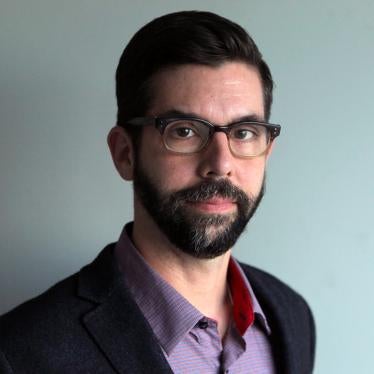The General Secretary of Libya’s General People’s Congress—the country’s equivalent of the prime minister—sat on the edge of a soft, green couch and told us how Libya wanted good relations with the West. Above him on the wall loomed a six-foot high portrait of leader Muammar Gaddafi wearing traditional Libyan garb with tinted sunglasses, watchful eyes staring down. The message was clear: the country had no prime minister. Similar portraits in other Tripoli offices we visited during Human Rights Watch’s first-ever trip to Libya in 2005 amplified the point. Libya had no justice or interior ministry, no trade unions or independent media. Libya had a single institution that dominated all aspects of life: Brother Leader Muammar Gaddafi.
That uni-polar state took a significant step towards changing with Libya’s elections this month. Instead of one dominant face, campaign posters for candidates were plastered on buildings and billboards. More than 3,000 people vied for 200 seats in the new assembly—men, women, liberals, Islamists, all wanting to help the new state.
A liberal coalition called the National Forces Alliance, led by war-time opposition leader Mahmoud Jibril, has apparently won 39 of the 80 seats for political parties followed by the Muslim Brotherhood's party with 17. The leadership of the assembly remains unclear, however, because 120 seats are for individual candidates with unknown allegiances.
Now the hard work of building a functional and representative political system begins. In a country where many militias refuse to disarm, the new General National Congress must appoint a government, pass laws, and prepare for parliamentary elections next year. It may play a role in drafting a constitution. These are daunting tasks.
To start, Libya’s new leaders should promote an accountable government, which the country lacked for more than four decades under Muammar Gaddafi and during the year since his fall. They should work in a transparent way, fight corruption and pass laws that protect human rights. They must find a way to convince the anti-Gaddafi militias that the central authority is a body they can trust.
Above all, the congress and the new government should build the rule of law that Gaddafi trampled on for 42 years. This means bringing the roughly 5,000 detainees currently held by militias under state control, and giving all detainees a prompt judicial review—some have been held without seeing a judge for more than a year. Those against whom there is no evidence should be released. The ongoing use of torture must cease. Top officials from the Gaddafi era who committed crimes deserve to be punished. But Libya needs to break with past practice of political trials and grant all defendants their fair trial rights. Guilt based on evidence should replace guilt based on politics or association.
Thirty-two women apparently won seats in the congress. The active participation of these and other women is critical for Libya’s transition, including in drafting the new constitution.
Perhaps the biggest challenge for this and future Libyan governments will be how to establish a strong state without the abusive mechanisms of state control. Libya needs police, but not police abuse. It needs an intelligence agency, but not illegal spying on e-mails and phone calls of the peaceful opposition. It needs a military that defends the nation—not one family or clan.
This will not be easy to achieve because states emerging from dictatorship can easily slip back to practices of the past. Libya has already shown troubling signs of this, passing laws in recent months that ban glorification of Gaddafi and protect from prosecution people who committed crimes if their actions were aimed at promoting or protecting the [anti-Gaddafi] revolution. Fortunately, Libya’s Supreme Court struck down the law banning Gaddafi’s glorification as an unlawful restriction on free speech. The law shielding anti-Gaddafi forces remains.
Whether future Libyan governments will refrain from persecuting their critics remains to be seen. Libya lacks a tradition of dissent—Gaddafi called his critics “stray dogs.” And it lacks the independent institutions that can constrain a government’s power to abuse, although the Supreme Court showed that it can play this role. With so many important choices to make while re-building the state—in drafting the constitution, deciding the role of Islam, determining how to share oil wealth—Libyan authorities would be wise to entertain criticism and dissenting views.
No doubt Libya’s transition will have dramatic twists and turns. Regionalism, poverty and well-armed militias pose serious threats. But this month Libyans took an important step to transform their country from the domain of one man to the home of many.
Fred Abrahams is special advisor at Human Rights Watch who coordinated the organization’s coverage of the 2011 conflict.








